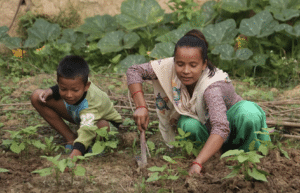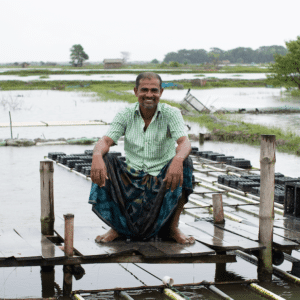The term eco-anxiety (also referred to as climate anxiety) is used to describe a heightened emotional and mental state in response to the dangers of climate change. It was summed up in a 2017 report by the American Psychological Association, as “a chronic fear of environmental doom”. Find out more about eco-anxiety and what you can do to manage it.
The psychological impact of climate change
Whatever words we choose to describe our worries about climate change, anxiety and fear are certainly not the only ones that would apply. Many people feel anger, helplessness, sadness, and even grief. These feelings can either be a catalyst to action, or lead to inaction and frustration with a feeling that “there’s nothing I can do”.

Pooja, a farmer in Nepal, told us of her anxiety about the future due to climate change making farming increasingly difficult.
Is eco-anxiety normal?
Yes – it’s a natural response to the changes we’re witnessing in our climate and environment. Because it’s such a widescale problem, it’s often hard to know where to begin, and because of this, feel out of control of the situation. If you struggle with eco-anxiety, you’re not alone.
As we watch the effects of climate change unfold, we’re bound to feel a sense of frustration. We may feel guilty thinking about how our actions, and the actions of others, will come to impact future generations. It can be enormously stressful to think of how we as individuals can make a difference in the wake of the climate crisis.
The podcast Me and My Eco-anxiety on BBC Sounds explores the sometimes overwhelming impact on mental health that all the stories about the damage to our planet can lead to.
Are you suffering from eco-anxiety?
If you often feel overwhelmed in the face of the climate emergency, you may be experiencing climate anxiety.
The important thing is to not to put too much pressure on yourself. It’s impossible to take on the climate crisis alone. By taking small steps, whether that’s joining an environmental group or brushing up on ways to be more environmentally friendly, you’re doing what you can.
You can make a start by factoring climate friendly options into your daily life, such as the food you choose to eat and the clothing you wear. It’s easy to feel disheartened, but it’s important to try and remember that we can only make a difference in the way we live our own lives.
How to cope with eco-anxiety
If you’re experiencing feelings of anxiety that are affecting your mental health, there are various ways that you can seek support. The NHS offer advice on general anxiety disorder with both relaxation techniques and information about Cognitive Behavioural Therapy (CBT).
Some studies have shown that learning more about the science behind climate change can help to lessen anxiety. It might also help to talk about what you’ve learned, and how you’re feeling, with trusted friends or family members.
Other researchers have theorised that eco-anxiety is, in part, a sign of how many people in more developed countries have lost touch with the planet we live on and suggest that getting more in touch with nature, through gardening or walking in the countryside, can help.
Some people may find that taking action in our own lives can reduce the feelings of hopelessness and allow them to feel more empowered. There are practical things that we can all do to change our lives and every journey starts with one small step. As this quote in a BBC article sums up,
“Firstly, make climate change a factor in the decisions you make around what you eat, how you travel, and what you buy. Secondly, talk about climate change with your friends, family and colleagues. Finally, demand that politicians and companies make it easier and cheaper to do the right thing for the climate.”
A long running BBC series is also available as a podcast. Costing the Earth presents fresh ideas from the sharpest minds working towards a cleaner, greener planet’ and is well worth subscribing to.
The climate crisis is the greatest challenge facing humankind. Eco-anxiety is a real and normal response to an issue of such magnitude. But many people around the world are learning to cope with the practical and psychological impacts of the changing climate. By learning from them and making small steps in our own lives, we can lessen anxiety and make a real difference to our shared future.

